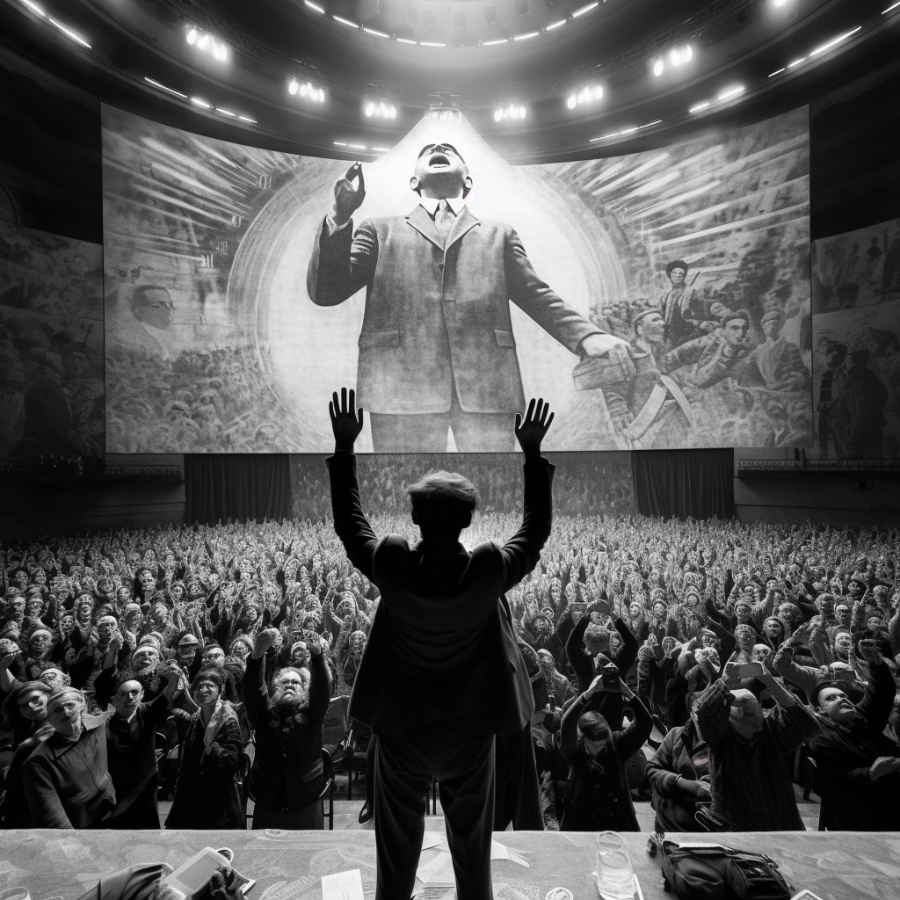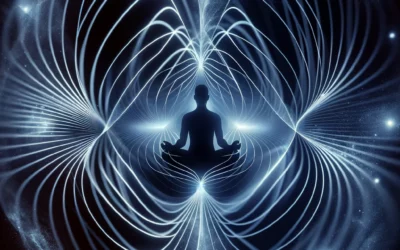The phrase “occult magic” denotes a collection of esoteric and cryptic practices, ceremonies, and convictions with the intention of attaining and exercising authority and sway by the manipulation of supernatural entities, forces, and symbols (Hanegraaff, 1996). Occult magic finds its origins in ancient civilizations and has undergone a gradual metamorphosis over time, often entangled with religion, philosophy, science, and art (Faivre, 1994).
The very core of occult magic resides in the notion that there exist clandestine powers and laws in the cosmos that, if mastered, can be harnessed to bring about transformations in both the corporeal and spiritual realms (Couliano, 1987). This concept of controlling and manipulating imperceptible forces bears a remarkable resemblance to contemporary means of governance utilized by dominant institutions to sway individuals and societies.
There exist practical examples of the resemblances between occult magic and modern methods of control, which can be illustrated as follows:
Symbolism
Occult magic often employs symbols and ceremonies to exert its power and influence (Greer, 2003). Similarly, in contemporary society, we can observe the use of symbols and imagery in political campaigns, advertising, and corporate logos to sway public opinion and consumer behavior (Williamson, 1978).

Secrecy and exclusivity
Occult practices often highlight the importance of maintaining secrecy and belonging to exclusive groups or orders (King, 1970). Likewise, in present-day society, we can observe similar exclusivity and secrecy in the form of secret societies, political backrooms, and closed corporate cultures, all of which wield power and influence outside the purview of the general public (Domhoff, 2005).
Manipulation of information
The crux of occult magic revolves around the control of concealed knowledge and manipulation of information to amass power (Evans, 2007). In contemporary society, we witness this reflected in the governance of information and communication channels by governments and powerful organizations, manifesting as censorship, surveillance, and the spread of misinformation (Andrejevic, 2007; Benkler, 2006).
Group dynamics and social control
Occult magic often employs group dynamics, initiation rituals, and social hierarchies to enforce loyalty and obedience (Webb, 1974). Correspondingly, in modern society, we observe similar group dynamics and social control mechanisms in organizations, religions, and political parties, all of which play a role in upholding norms and values and encouraging conformity and obedience (Asch, 1951; Milgram, 1963).
Psychological manipulation
Occult magic leverages psychological manipulation and suggestion to sway the beliefs and behaviors of individuals (Hess, 1993). Similarly, in modern society, we find comparable psychological manipulation tactics in marketing, political propaganda, and mass media, all of which seek to influence our emotions, thoughts, and actions (Bernays, 1928; Cialdini, 2001).

Exercise of power through authority
Occult magic often accentuates the significance of authority and hierarchy in the exercise of power and control (Butler, 1997). In contemporary society, we perceive a parallel exercise of power by authority figures, such as politicians, business leaders, clergy, and other influential individuals, who leverage their position and status to exert influence over others (French & Raven, 1959).
Creating dependency
Occult magic can foster relationships of dependency, wherein individuals feel obligated to remain loyal to the magician or group due to their reliance on the purported benefits and protection that magic provides (Luck, 2006). In present-day society, we witness similar relationships of dependency manifested in economic and social dependence, such as through debt, unemployment, social security, and healthcare (Standing, 2011).
The creation of fear and uncertainty
Occult magic can be employed to instill fear and uncertainty, rendering individuals more susceptible to manipulation and control (Trombley, 1990). In contemporary society, we encounter comparable tactics in the form of fear-mongering and the amplification of threats, such as terrorism, crime, and economic instability, to reinforce political and social control (Altheide, 2006).

Employment of technology
Although occult magic is frequently associated with supernatural powers, there are also instances where technological means are utilized to exercise power and control (Drury, 2000). In modern society, we observe an escalating dependence on technology, such as the internet, social media, and surveillance, to monitor and control individuals (Zuboff, 2019).
The use of rituals and ceremonies
Occult magic often utilizes intricate rituals and ceremonies to wield power and influence, with participants experiencing a sense of solidarity and obedience (Eliade, 1959). In contemporary society, we observe similar rituals and ceremonies in political, religious, and social contexts, such as elections, inaugurations, and sporting events, which contribute to reinforcing social cohesion and maintaining power structures (Collins, 2004).
Myth-making and narrative construction
Occult magic employs myths, legends, and stories to construct a worldview that supports the belief in and legitimacy of magical practices (Von Stuckrad, 2005). In modern society, we encounter analogous myth-making and narrative construction in the form of national and cultural identities, political ideologies, and corporate missions, all of which contribute to creating a shared worldview and legitimizing power structures (Barthes, 1957).
The exploitation of vulnerable groups
Occult magic can be used to manipulate and control vulnerable or marginalized groups, for example, by offering them false hope of improving their situation or by blaming them for causing societal problems (Robbins, 2009). In contemporary society, we witness comparable exploitation of vulnerable groups by politicians, corporations, and other power structures, such as by exacerbating divisions and scapegoating (Wacquant, 2009).
Secrecy and exclusivity
Occult magic is often shrouded in secrecy and exclusivity, with only initiates having access to certain knowledge and practices (Hanegraaff, 1996). This can contribute to strengthening the practitioner’s position of power and creating an aura of mystery and awe. In modern society, we see similar secrecy and exclusivity in the form of secret societies, closed meetings, confidential information, and limited access to certain knowledge and expertise (Hutchinson, 2011).
Normalization of control mechanisms
Occult magic can be used to normalize and justify control mechanisms, such as by embedding magical practices in everyday culture and presenting them as a necessary and natural part of life (Faivre, 1994). In modern society, we see similar normalization of control mechanisms, such as surveillance, censorship, and regulation, which are often presented as essential for maintaining safety and order (Foucault, 1977).
Influencing perception and reality
Occult magic can be used to influence individuals’ perception and reality, such as by creating illusions, manipulating memories, or inducing hallucinations (Greer, 2003). In modern society, we see similar influence on perception and reality through mass media, advertising, propaganda, and technology, all of which are aimed at shaping our worldview and directing our behavior (Lippmann, 1922).
This exploration of the resemblances between occult magic and contemporary methods of control highlights the significance of acknowledging and comprehending the mechanisms of power and manipulation in diverse contexts. By scrutinizing these similarities, we can unravel and dissect the intricate dynamics of power and influence that impact our societies.
In the future, it is imperative that we continue to reflect on the ways in which power and control are wielded in both past and present societies. Through analyzing the parallels between occult magic and modern control techniques, we can acquire valuable insights into the fundamental principles that underlie the exercise of power and influence. This can help us become more discerning and critical citizens, capable of recognizing, comprehending, and challenging the power structures and control mechanisms that affect our lives. It is through this comprehension that we can work towards fostering a more equitable, inclusive, and democratic society for all.
In conclusion, it is evident that there are striking resemblances between the methods of control employed by occult magic in ancient civilizations and those employed by modern institutions to govern populations. Despite differences in their methods and contexts, both approaches share fundamental principles of power and manipulation that underpin their efficacy. By studying these resemblances, we can not only enhance our understanding of the ways in which power and control are exercised in different historical and cultural contexts, but also contribute to promoting a more just and equal world.
Couliano, I. P. (1987). Eros and Magic in the Renaissance. University of Chicago Press.
Domhoff, G. W. (2005). Who Rules America Power, Politics, and Social Change. McGraw-Hill.
Faivre, A. (1994). Access to Western Esotericism. State University of New York Press.
Greer, J. M. (2003). The New Encyclopedia of the Occult. Llewellyn Publications.
King, F. (1970). Ritual Magic in England: 1887 to the Present Day. Neville Spearman.
Williamson, J. (1978). Decoding Advertisements: Ideology and Meaning in Advertising. Marion Boyars.
Altheide, D. L. (2006). Terrorism and the Politics of Fear. AltaMira Press.
Bernays, E. L. (1928). Propaganda. H. Liveright.
Butler, E. M. (1997). Ritual Magic. Cambridge University Press.
Drury, N. (2000). Magic and Witchcraft: From Shamanism to the Technopagans. Thames & Hudson.
Standing, G. (2011). The Precariat: The New Dangerous Class. Bloomsbury Academic.
Trombley, S. (1990). The Execution Protocol: Inside America’s Capital Punishment Industry. Crown.
Foucault, M. (1977). Discipline and Punish: The Birth of the Prison. Vintage Books.
Lippmann, W. (1922). Public Opinion. Harcourt, Brace and Company.




